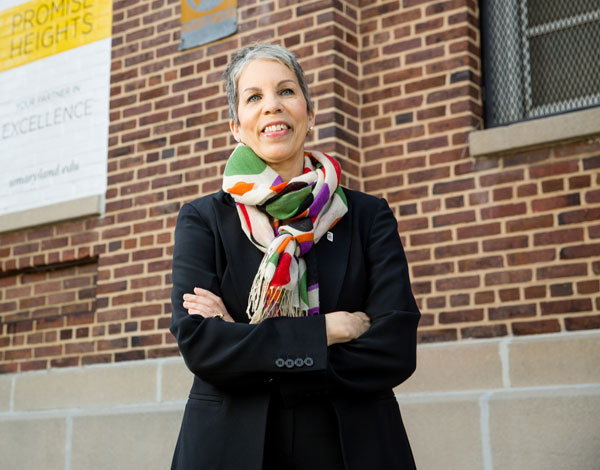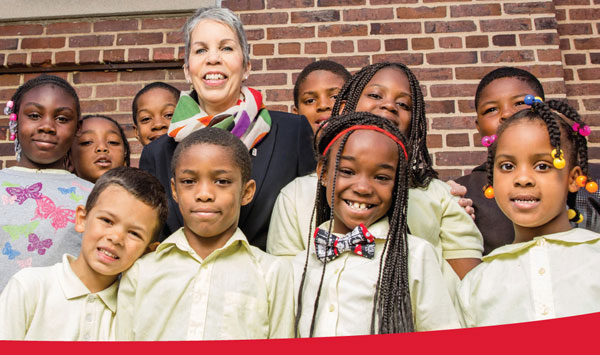- Posted in All University
- Category: Campus News
Bronwyn Mayden ’74 serves as the assistant dean in the University of Maryland School of Social Work and as executive director of Promise Heights. She has an extensive history in program planning, policy development, community organizing, health promotion and marketing in the public and nonprofit arenas. As assistant dean, she is responsible for the overall performance and viability of the Office of Continuing Professional Education — the second largest continuing profession education program for social workers in the country.
She also is responsible for Promise Heights, the University of Maryland, Baltimore’s (UMB) program that seeks to improve the health, educational, and developmental outcomes for children and their families in one of the most distressed communities in West Baltimore. Under her leadership, PH was named a federal Promise Neighborhood.
Mayden has been honored for her work with Promise Heights by the University System of Maryland’s Board of Regents for Public Service in 2015 and was named the UMB Public Servant of the Year in 2017.
She received her master’s degree in social work from the University of Maryland School of Social Work in 1977 and her bachelor’s degree from Lincoln University in 1974. She is married and is the proud mother of two sons, Adam and John.

From her early days as an advocate for adolescent and reproductive health and civil rights, to her current work as executive director of Promise Heights, an academic‒community partnership in one of Baltimore’s neediest communities, Bronwyn Mayden is dedicated to improving the lives of young people and their families.
“I am proud of work the University of Maryland, Baltimore is doing in West Baltimore,” says Mayden. “All of the UMB schools work in the Promise Heights community on this initiative.”
Promise Heights is a cradle-to-college-to-career program in the West Baltimore neighborhoods of Upton and Druid Heights. Representatives of UMB’s six professional schools base their work in the four public schools there to reach students, families, and residents as they move through the pipeline of services and programs, many of them originated or coordinated by UMB.
Mayden and her team use a framework of school and community indicators to measure how well they’re doing on behalf of the neighborhoods’ students and families. The program is partially funded through a U.S. Department of Education Promise Neighborhoods grant, but also by the Maryland State Department of Education, the Family League of Baltimore, and local foundations. Promise Heights partners with faith-based, government, and nonprofit organizations.

Mayden was drawn to social work because of her childhood experiences with civil rights. She recalls the day her mother and older sister marched to integrate a Baltimore amusement park, and someone spat on her sister.
Around that time, Mayden’s elementary school was one of the first to integrate in Baltimore City. “I didn’t understand why the kindergarten teacher treated me differently from my peers,” she says. “My schoolwork was never displayed on bulletin boards, and rarely was I called upon in class. I believe that injustice ignited my desire to become involved in social justice issues.”
Today, Mayden and her colleagues improve the lives of thousands of disadvantaged children and families. “Working with a dedicated staff, we try to make sure every child receives whatever he or she needs, whether it is help with math, counseling because of a crisis at home, or simply a pair of eyeglasses,” says Mayden. “We want every child to be healthy and successful.”
Mayden, an alumna of UMB’s School of Social Work, says she’s most inspired by “the children and families, how they work so hard to overcome the odds.” Like her mother, a career public school teacher, she thrives on the rewards that come from helping shape future generations.
“Bronwyn has a remarkably fast mind, enormous stamina, the capacity to make strong relationships quickly and nurture them for years, the clarity to work with a wide array of people to develop powerful ideas for community engagement and improvement, and to get funding for them,” says Richard P. Barth, PhD, MSW, dean of the School of Social Work. “Bronwyn’s dedication to improving the culture of parenting and
the educational programs in West Baltimore knows no bounds. I count myself most fortunate to know this champion for change.”
Adapted and reprinted with permission of the Champions of Excellence series at the University of Maryland, Baltimore. View Mayden’s story and others at www.umaryland.edu/champions/.